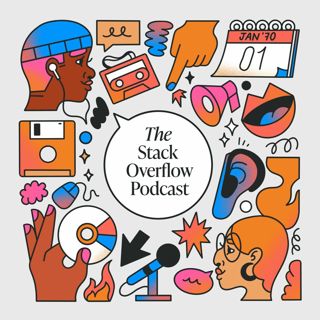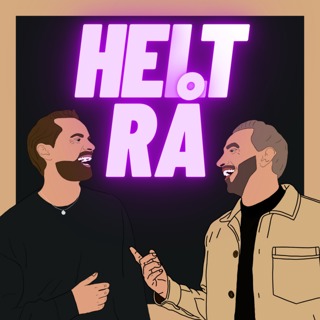
Gen Z doesn’t understand file structures
It’s not news that, as Cassidy says, “remote has grown wildly fast”—but Remote has gone from about 25 employees in March 2020 to 900 now (a 3,500% increase).Ceora explains to Matt (oh, sweet summer’s child) what it means to get ratioed on Twitter.Inspired by a great read, the team discusses how Gen Z, having grown up without floppy disks, file folders, or directories, thinks about information.This week’s Lifeboat badge goes to user 1983 for their answer to the question Why can I not use `new` with an arrow function in JavaScript/ES6?.See Privacy Policy at https://art19.com/privacy and California Privacy Notice at https://art19.com/privacy#do-not-sell-my-info.
15 Feb 202221min

China’s only female Apache member on the rise of open source in China
SphereEX builds distributed data systems, making it easier for organizations to load balance massive data stores across multiple servers. Now that open-source software has taken over Western software, it’s China’s turn. Even big companies like Baidu and Bytedance are opening up their projects. Trista is the only female Apache member in China, which is both an honor and a demonstration of how much work needs to be done to support women in STEM. This episode’s Lifeboat badge shoutout goes to swati kiran for her answer to Error: EACCES: permission denied, mkdir '/usr/local/lib/node_modules/node-sass/build'.See Privacy Policy at https://art19.com/privacy and California Privacy Notice at https://art19.com/privacy#do-not-sell-my-info.
11 Feb 202227min

There’s no coding Oscars. Write software that works
Ceora has her second brain stored in Notion, complete with GIFs and pretty color to get that aesthetic.Ancient history in blog years: Cassidy talks about the perils of being bleeding-edge instead of cutting-edge: Apollo Mission: The pros and cons of being an early adopter of new technology Everybody is aboard the VS Code train, which has the hottest TikTok around. Cassidy recommends the MonoLisa font helping viewers read your code during a livestream.Today’s lifeboat goes to Bill the Lizard for Using IFF in Python.See Privacy Policy at https://art19.com/privacy and California Privacy Notice at https://art19.com/privacy#do-not-sell-my-info.
8 Feb 202228min

Moving from CEO back to IC: A chat with Mitchell Hashimoto on his love for code
Neopets: A little-known gateway into a software career. (Nineties kids will remember.)Among the products Mitchell helped build at Hashicorp: Terraform, Vagrant, and Vault.Not many C-level execs return to IC roles, but you might be surprised how many managers move back to being individual contributors.Follow Mitchell on Twitter here.See Privacy Policy at https://art19.com/privacy and California Privacy Notice at https://art19.com/privacy#do-not-sell-my-info.
4 Feb 202235min

A collaborative hub for infrastructure as code
On this sponsored episode of the podcast, we talk with Marcin Wyszynski, founder and CEO at Spacelift. Marcin says Spacelift aims to be for infrastructure-as-code what GitHub is to git. It centralizes everything about your IaC system: it runs code, deploys within CI/CD pipelines, tracks the progress of your infrastructure, and gives you insight into who made what changes and why. Today it works with the IaC tools already out there: Terraform, Cloud Formation, and Pulumi, with plans to add support for services like Ansible and Kubernetes in the future. Like a lot of programmers, Marcin got into coding through games. Once he ran through the limited number of Commodore 64 games at his local shop in Poland, he learned to program his own. But he never thought of programming as a career, so when it came time to pick a college major, he followed a group of his peers into sociology. Sociology, with its heavy focus on statistics, brought him back to programming. He landed his first job at Google reviewing copy for Ads, which lasted until he could automate himself out of it. Google gave him increasingly technical roles until he moved into an SRE position handling tape backups, a job that is mostly very boring until it becomes extremely exciting. After that, it was a stint at Facebook spinning up point-of-presence clusters around the world, then CTO at a startup that didn’t catch on as he’d hoped. With this wealth of experience under his belt, he went into consulting. As a consultant, he had his bag of best practices, open-source tools, processes, and scripts that he brought with him, but he also built bespoke pieces of technology for every single one of his clients. One need his clients had in common was a way to manage the code that defined their infrastructure. During Marcin’s career, there were many times when he built the thing he needed: games, automation, scripts. When his consulting clients would leave for a new organization, they would reach out to ask if he could provide them with the solution he had built for infrastructure as code. Realizing that he had created something which addressed a pain point common to many companies, he decided to turn this solution into a new company: Spacelift. Spacelift aims to take the heavy lifting out of infrastructure-as-code, automate it, and make it auditable. When a change gets made, everyone can see it and comment on it. From the product manager to the junior dev, everyone knows what’s going on, even if an infrastructure change doesn’t fit the original architecture docs. Plus, the SRE team no longer need to go on archeological expeditions to find a database secretly running and costing the company five figures a month. To learn more about Spacelift, check out their website at https://spacelift.io/, where you can start a free trial and see it in action. See Privacy Policy at https://art19.com/privacy and California Privacy Notice at https://art19.com/privacy#do-not-sell-my-info.
2 Feb 202222min

Next stop, Cryptoland?
The Twitter thread that brought Cryptoland to the team’s attention.Ceora wonders whether participants in a hypothetical, decentralized version of YouTube (a YouTube-like dApp) would need coding skills to contribute meaningfully.Why is Ethereum so expensive and so congested?Ben outlines how Solana has become the fastest-growing blockchain in the world by evolving the Ethereum concept to make it more scalable and less congested.See Privacy Policy at https://art19.com/privacy and California Privacy Notice at https://art19.com/privacy#do-not-sell-my-info.
1 Feb 202236min

Using synthetic data to power machine learning while protecting user privacy
You can learn more about Gretel here. The company is hiring for numerous positions. Think your commits are anonymous? Think again: DefCon researchers figured out how to de-anonymize code creators by their style. We published an article about the importance of including privacy in your SDLC: Privacy is an afterthought in the software lifecycle. That needs to change.Our Lifeboat badge shoutout goes to 1983 (the year Ben was born) for their answer to Why can I not use `new` with an arrow function in JavaScript/ES6?See Privacy Policy at https://art19.com/privacy and California Privacy Notice at https://art19.com/privacy#do-not-sell-my-info.
28 Jan 202226min

How to defend your attention and find a flow state
The inspiration for today's episode was a terrific article from The Guardian about the many ways in which the modern world, specifically the software we use every day, was designed to steal our attention. During the episode, we discuss Mihaly Csikszentmihalyi, a professor know as the "father of flow" for his pioneering research on flow states. Sadly, Prof. Csikszentmihalyi passed away in 2021, but you can find a terrific tribute to him and his work here.In the second half of the episode, we discuss "The California Ideology" and the ways in which hustle culture and libertarian ideals helped to shape Silicon Valley and the world of technology more broadly.Congrats to our lifeboat badge winner of the week, UrbanoJVR, who answered the question: What is the difference between 'mvn verify' vs 'mvn test'?See Privacy Policy at https://art19.com/privacy and California Privacy Notice at https://art19.com/privacy#do-not-sell-my-info.
25 Jan 202223min





















